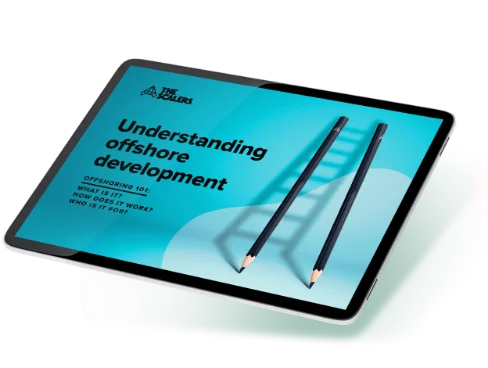#Mythbuster – Does going offshore mean risking quality?

What’s the first thing that comes to mind when you hear the words offshore software development? Do you associate going offshore with terms like ‘cost arbitrage’ and ‘low quality’? Have you had a negative first-hand experience or heard of stories about going offshore and experiencing failed IT projects, security breaches, and chaos?
For many, the stigmas about going offshore and building a team in a foreign country are enough to put them off the idea. So, we bring to you a new series: #MYTHBUSTER. Through a series of posts, we’ll explain to you what’s true about offshoring, what’s not, and where you need to tread with caution!
Let’s start with a super popular myth and debunk it, shall we?
Going offshore means risking quality (Does it?)
First things first, what does going offshore in the IT world really mean? Going offshore means setting up a distributed team of engineers. These engineers are full-time employees and are a value-adding extension of your business in another country.

But why do you have to go offshore? Can’t you find engineers locally?
Unfortunately, there is a massive talent shortage in the US, the UK and other Western countries too. For instance, a study conducted by the government of the UK showed that for the engineering sector to gain enough talented candidates to reduce the skills shortage, they would need 186,000 skilled recruits each year until 2024. However, given that the number of engineering graduates in the UK every year are simply a fraction of that number, this is a far-fetched ideal scenario.

Many companies in the world find themselves looking at hundreds of resumes, and still don’t find the candidate that they’re looking for. Talented engineers who are confident of their technical knowledge demand salaries that are way higher than industry standards, and unfortunately, the price has to be paid. This puts companies in a spot because not only are they unable to scale at the pace they want to, but they’re also paying through their nose to make it happen!

Your crash course on everything offshoring. What is it? How does it work? Is it for you?
DOWNLOAD EBOOKA drive for transformation
Ultimately, the battle for top talent can be boiled down to a case of supply and demand – there’s an imbalance between the need for a digitally savvy workforce and the availability of workers trained in those skills. Organisations from banks to retailers to automotive manufacturers are becoming digital businesses.
Business leaders in the UK, US, Australia, and other leading markets are acutely aware of the need to embrace technology as a means to achieve business goals, and that responding to the digital skills gap is an imperative. The availability of these skills is key to powering the ongoing transformation of businesses in the country in order to survive and thrive in a post-Covid landscape.
Thinking globally about talent gives businesses a competitive advantage, you’re able to tap into pools of skills that they can’t and as a result — innovate faster and bring products to market quicker than them. It’s the way many CTOs in the post-pandemic world are thinking about building their tech teams — augmenting existing talent at home with world-class engineers from overseas locations.
Enter Offshoring!
Let’s get the cost out of the way. Going offshore to a country like India is undeniably cost-effective, owing to the lower cost of living in these countries. However, cost arbitrage is simply a by-product of offshoring and does not determine the quality of services you get.
The lower cost of living ensures that the disposable income of an engineer is significantly higher than in the West, which explains the difference in salaries. It also explains why office space is cheaper, utilities don’t cost an arm and a leg, and why employee-centric benefits are not few and far in between. As the cost of living survey below suggests, Bangalore in India is significantly cheaper than most countries in the world.

Let’s consider India, a country that generates roughly 1.5 million engineers every year. After San Francisco and Singapore, Bangalore is one of the world’s most highly-prized R&D locations. It is even known as “the Silicon Valley of India” for its tremendous success in engineering and scientific innovation. Companies like Microsoft, Google, SAP, Yahoo – they all have their R&D centres in Bangalore. They chose to go offshore because of the immense value that it brings – the ability to scale operations and build bigger, better, and more efficient teams.

Can’t find the skills you need at home? Stop searching and start scaling
LEARN MOREHow does all this equate to quality?
All that’s been said and done states one simple fact — if the lowest price is your priority, then chasing the cheapest offshore “vendors” who are not qualified to understand the finer nuances of your requirements won’t get you quality.
That’s not because of offshoring – that’s a management’s approach.
If you want to ensure quality, then leveraging the right offshore development company can provide you access to top-tier talent. The right partner is one that can equip you with the smoothest processes, find you best of the best talents and take off your shoulders any concerns that you may have about the quality. Best proof? The companies’ current happy customers!

The right partner will be able to understand your business model, the kind of team that you’re looking for, your static and dynamic requirements, and should be able to guarantee that there will be no compromise on quality. They should also be able to set-up a dedicated recruitment process and culturally and technically test candidates before they are a part of your A-team.
In countries like India, where English-speaking engineering talent is abundant, this means that you can scale sustainably without having to compromise on output quality – provided you work with the right partner. And if you make that effort, there’s no reason to think your team will deliver sub-standard work. In fact, you may even find yourself among Google and Microsoft, with some of the best teams in the industry!
Quality really isn’t about going offshore — it’s about effort in finding an offshore partner who can do that. And much more. If you want to know more about going offshore or building your own development team in Bangalore, feel free to reach out to us by filling out the contact form.















